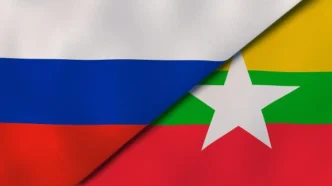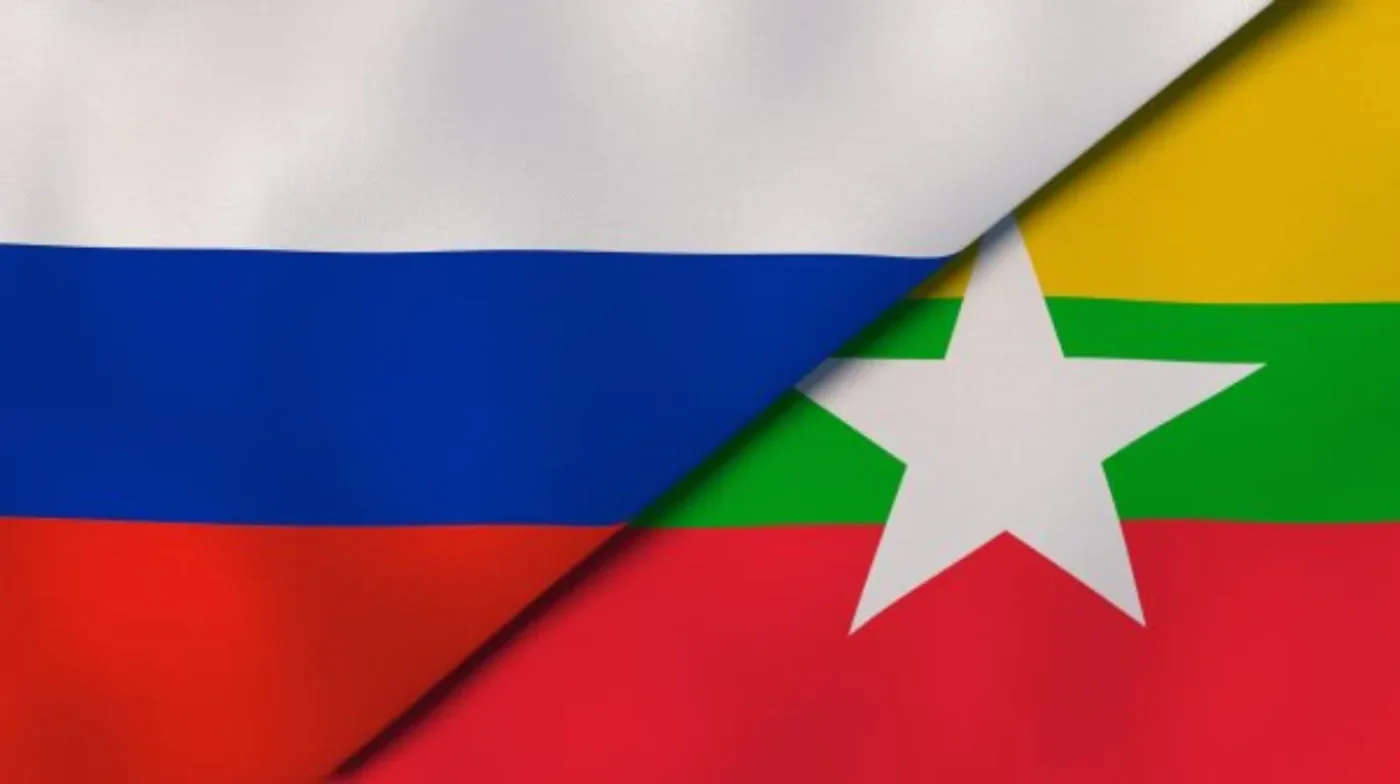In a significant display of diplomatic engagement, Russian President Vladimir Putin and Myanmar’s military chief, Senior General Min Aung Hlaing, met at the Grand Kremlin Palace in Moscow on 4 March 2025 to bolster bilateral ties. The meeting, marked by a formal signing ceremony, underscored a deepening relationship between the two nations at a time when both face intense international scrutiny over their respective political and human rights records. This encounter, the second between the leaders, signals a mutual intent to expand cooperation across trade, energy, and possibly nuclear technology, raising questions about the broader geopolitical implications for South East Asia and beyond.
The talks, attended by high-ranking officials from both sides, including Myanmar’s Union Ministers and Russia’s Minister of Foreign Affairs, focused on enhancing friendship and cooperation. President Putin expressed satisfaction at the growing trade relations and the potential benefits of the agreements signed during the visit. General Min Aung Hlaing, who also serves as Chairman of Myanmar’s State Executive Council and Prime Minister, reciprocated the sentiment, highlighting the long-standing diplomatic ties—spanning 77 years—between the two nations. Discussions reportedly spanned economic development, investment, manufacturing, agriculture, and livestock, with hints of collaboration in more sensitive areas such as nuclear energy.
A Partnership Under the Spotlight
The timing of this meeting is noteworthy. Myanmar’s military regime, which seized power in a 2021 coup, has faced widespread condemnation for its crackdown on dissent and the ensuing humanitarian crisis. General Min Aung Hlaing, a central figure in the junta, remains a polarising leader, with many in the international community accusing his administration of gross human rights violations. Similarly, Russia, under President Putin, is grappling with global isolation due to its actions in Ukraine and allegations of election interference and cyber warfare. The alignment of these two governments, both ostracised by much of the Western world, suggests a strategic partnership aimed at countering international pressure.
Analysts speculate that Russia sees Myanmar as a foothold in South East Asia, a region where it has historically had limited influence compared to China or the United States. For Myanmar, Russia offers an alternative source of military hardware, economic support, and diplomatic backing at forums like the United Nations, where both nations often align against Western resolutions. If confirmed, such a dynamic could reshape regional power balances, particularly in the context of the Association of Southeast Asian Nations (ASEAN), which has struggled to address Myanmar’s political crisis. However, it must be noted that no concrete evidence currently confirms specific military or nuclear deals beyond the general agreements mentioned during the Moscow talks.
Trade and Economic Cooperation: A Growing Bond
One of the central themes of the meeting was the enhancement of trade relations. President Putin noted that bilateral trade has improved in recent years, though exact figures remain undisclosed in official statements. Myanmar, with its abundant natural resources and strategic location, presents opportunities for Russian investment in sectors like energy, mining, and infrastructure. In return, Russia could provide technological expertise and capital, areas where Myanmar’s junta is keen to bolster its legitimacy through economic progress.
The mention of nuclear energy cooperation, though not detailed in public statements, has raised eyebrows. Russia has a track record of exporting nuclear technology to developing nations as a means of cementing alliances. If such discussions are underway with Myanmar, they could involve civilian nuclear power projects or technical training. However, any move towards nuclear collaboration would likely attract significant international concern, given Myanmar’s unstable political environment and the potential for dual-use technology. As no official confirmation of such plans exists, this remains speculative, and any analysis must be treated with caution until verified by credible sources.
Agriculture and livestock were also highlighted as areas of mutual interest. Myanmar’s agrarian economy could benefit from Russian expertise in modern farming techniques, while Russia might seek to diversify its food imports amid Western sanctions. These sectors, though less geopolitically charged, underscore the practical dimensions of the partnership, aimed at addressing domestic needs on both sides.
Historical Ties and Modern Ambitions
General Min Aung Hlaing’s reference to Russia as an “old friend” of Myanmar reflects a relationship rooted in Cold War-era alliances, when the Soviet Union provided support to Myanmar’s then-socialist government. Diplomatic relations, established 77 years ago, have endured despite geographical distance and ideological shifts. The current alignment, however, appears driven more by pragmatic necessity than historical nostalgia. Both nations are navigating a world order increasingly defined by great power rivalry, with Russia seeking to expand its influence in Asia and Myanmar desperate for allies amid internal strife and external sanctions.
This meeting, held during what was described as a “state-level goodwill visit,” is not an isolated event. The leaders previously met at the 7th Far East Economic Forum, indicating a pattern of sustained engagement. The personal rapport between Putin and Min Aung Hlaing, evident in their warm public exchanges, may further facilitate cooperation, though it also draws criticism from those who view the partnership as a union of authoritarian regimes.
Regional and Global Implications
The strengthening of Russia-Myanmar ties does not occur in a vacuum. South East Asia remains a contested space, with China, the United States, and India all vying for influence. China, Myanmar’s largest trading partner and a key supporter of the junta, may view Russia’s growing presence with a mix of wariness and indifference. While Beijing and Moscow often coordinate on global issues, competition for influence in Myanmar—particularly over access to resources and strategic corridors like the Bay of Bengal—could introduce tensions.
For ASEAN, the Moscow meeting complicates efforts to mediate Myanmar’s crisis. The regional bloc has faced criticism for its inability to enforce its Five-Point Consensus plan, which calls for an end to violence and inclusive dialogue in Myanmar. Russia’s backing of the junta could embolden General Min Aung Hlaing to resist ASEAN’s diplomatic overtures, further stalling progress towards stability. If this partnership yields tangible military or economic support for the regime, it may also prolong Myanmar’s civil conflict, which has displaced millions and devastated the economy.
Globally, the West is likely to view this development with concern. The United States and European Union have imposed sanctions on both Russia and Myanmar’s military leadership, aiming to curb their respective policies. A closer alliance between Moscow and Yangon could undermine these efforts, providing both nations with avenues to circumvent economic restrictions. However, the extent to which this partnership can offset Western pressure remains unclear, as neither country has the capacity to fully replace lost trade or diplomatic ties with major global economies.
Challenges and Uncertainties
Despite the optimism expressed during the Moscow talks, significant hurdles remain. Myanmar’s internal instability, marked by ongoing resistance from ethnic armed groups and pro-democracy forces, limits the junta’s ability to deliver on international commitments. Economic agreements with Russia, while promising on paper, may struggle to materialise amid such chaos. Similarly, Russia’s own economic constraints, exacerbated by sanctions and the costs of its military engagements, could temper its capacity to invest heavily in Myanmar.
Public sentiment in Myanmar is another factor. While the junta may welcome Russian support, many citizens, particularly those opposing military rule, are likely to view this alliance with suspicion. Russia’s reputation as an authoritarian state could further alienate segments of Myanmar’s population, who associate foreign partnerships with regime entrenchment rather than national benefit. Social media platforms, often a barometer of public opinion in the region, may reflect such discontent, though access to independent voices remains limited under the junta’s internet restrictions.
Looking Ahead: A Strategic but Risky Alliance
The Moscow meeting between President Putin and General Min Aung Hlaing marks a pivotal moment in Russia-Myanmar relations, with potential ramifications for South East Asia’s geopolitical landscape. While the immediate outcomes—signed agreements and enhanced trade—appear mutually beneficial, the long-term implications are less certain. If cooperation extends to sensitive areas like nuclear energy or military support, it could provoke a backlash from regional and global actors, further isolating both nations.
For now, the partnership serves as a reminder of the complex interplay between domestic imperatives and international strategy. Myanmar’s junta seeks legitimacy and resources to sustain its grip on power, while Russia aims to project influence in a region critical to global trade and security. Whether this alliance can withstand internal and external pressures remains to be seen, but its emergence signals a new chapter in the intricate web of South East Asian politics.
As the dust settles on the Kremlin talks, the international community will be watching closely. The balance between cooperation and confrontation in this relationship may well shape not only the futures of Russia and Myanmar but also the broader dynamics of a region at the crossroads of global power.
















